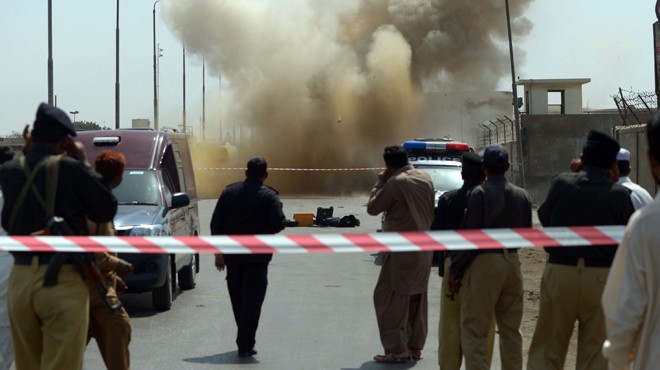

Tragic assassination of four youths claimed to be associated with a major political party brought Karachi to a grinding halt on May 2. Sindh chief minister took notice and instructed the police to conduct investigations. But this is not the first instance. Karachi has been under siege of outlaws of various origins and backgrounds for a decade. Administration always pronounces tough stances against law breakers, but all in vain.
Unfortunately, the steps being mulled over by the concerned quarters are entirely cosmetic in nature. The urban centres in Sindh and other provinces, like other locations, appear to be under grave threat of violent attacks, routine crimes notwithstanding. It is disappointing to note that the various high ups have shown their inability to combat target killers and kidnappers. The innocent citizens are thus exposed to the most serious threat of such crimes where possibility of formally locating the culprits is negligible. In order to safeguard the communities, the administration shall have to turn to the very basics.
A sizable number of citizens consider police as a part of security problem rather than a solution. They have many valid reasons for this self-derived conclusion. The police deserted the people during the December 2007 mayhem and many similar situations. Unless the trust is not revived, the acquisition of public safety shall remain an elusive entity.
Under the smokescreen of terrorism and extremism, we are made to believe that fundamental procedures of governance no longer remain valid. Rise in illegal possession and usage of arms is a foremost issue. At one end, the sophistication and precision of technology has made possible the detection of even insects on the ground. On the other, there is absolute reluctance to check manufacturing, marketing, disposal and use of illegal arms. In aborted Lyari operation two years ago, many security analysts considered the accumulation of arms by the hardened criminals as the main reason for compounding of the situation.
If the political will and administrative resolve is developed to control the spread of arms, a significant headway can be made in improving the law and order situation.
The next matter is the process of issuing licenses for arms which is found to be cumbersome. As many areas in the country have a custom of displaying arms, the same can be regularised by taking appropriate measures. This cannot be settled without taking the political parties, communal groups and tribal chieftains into confidence. There could be an all parties conference simply to deliberate this single issue which is enormously impacting the lives and liberty of common folks, both in urban and rural contexts. Without imposing a strict and potent regulatory regime on the availability, display and usage of arms, public safety can never be ensured.
For macro scale maintenance of order, few considerations need a threadbare analysis. The peculiar disappearance of all the office-bearers of district administration and police force from the settlements in general and sensitive locations in particular must not go un-investigated. People of Pakistan are given this oft-repeated message that law and order cannot be maintained without deployment of paramilitary outfits including Rangers, Scouts, Constabularies and reincarnated police units.
When the ultra-orthodox were busy burning cinema houses and looting on the MA Jinnah Road in September 2012, none of these elite security agencies could safeguard the lives and property of common people. Having fortified themselves in the confines of police stations or cantonments, these symbols of establishment left the ordinary citizens at the mercy of hoodlums. Declining competence, inability to cope with normal duties, politicisation of essential security services and clandestine manipulation by secret agencies has marred the daily life beyond limits. Apart from the government, people will also have to play a pro-active role in maintaining security.
The maintenance of security is a doable task. Few pre-requisites are mandatory. Strict enforcement of merit in the recruitment of police force personnel and other agencies, provision of high standards of training, usage of contemporary technology, elimination of political influence from transfers and postings, enhancement of police-citizen interface and time-bound eradication of illegal arms are some essentials for peace and law and order in the society.